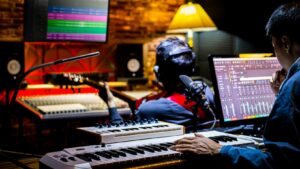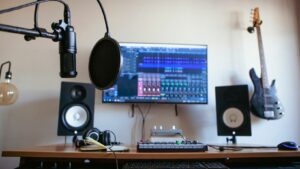In the ever-evolving landscape of the music industry, technology plays a pivotal role. It’s not just about strumming guitars or belting out high notes anymore; it’s about harnessing the power of tech to create, distribute, and monetize music. This shift has given birth to a myriad of exciting career opportunities in music technology.
Whether you’re a music enthusiast looking to blend your passion with your tech skills, or a tech guru with a soft spot for melodies, there’s a place for you in this dynamic field. From sound engineering to software development for music apps, the spectrum of music technology jobs is as diverse as it is promising. Let’s delve into the world of music tech careers and explore the opportunities that await you.
Music Technology Jobs
 Music producers stand at the intersection of sound and technology. Their role involves not just the creative aspects of music but also the technical aspects of production. Mastering digital audio workstations, synthesizers, and other production equipment forms a significant part of their duties. Music producers arrange and mix sounds, combine tracks, and ensure the final recording conveys the intended theme and emotion. Additionally, they interact with artists, manage studio time, and even navigate contract negotiations, making it a versatile profession in the realm of music technology.
Music producers stand at the intersection of sound and technology. Their role involves not just the creative aspects of music but also the technical aspects of production. Mastering digital audio workstations, synthesizers, and other production equipment forms a significant part of their duties. Music producers arrange and mix sounds, combine tracks, and ensure the final recording conveys the intended theme and emotion. Additionally, they interact with artists, manage studio time, and even navigate contract negotiations, making it a versatile profession in the realm of music technology.
For instance, producers in the electronic genre often write beats, mix tracks, and innovate with soundscapes using a range of software. Modern production tools like Ableton Live, Logic Pro, and Pro Tools remain central to their workflow. Hence, proficiency in these platforms can set the stage for a successful career in music production.
Sound engineers work behind-the-scenes, shaping the sound quality and tone of music recordings. Their expertise in acoustics and audio equipment positions them as integral for perfecting the output in both studio and live settings. Sound engineers setup, test, and adjust recording equipment; troubleshoot technical issues; and meticulously balance and mix the audio to achieve the envisioned end-product.
Consider the environment of a live concert. Sound engineers control and adjust the audio experience for the audience, factoring in elements like the venue’s acoustics, the musicians’ needs, and the audience’s position.
Education and Training Requirements
 In music technology careers, candidates demonstrate their eligibility and preparedness for roles through education and comprehensive training. Success in the field largely depends on a firm foundation of knowledge and the development of applicable skills.
In music technology careers, candidates demonstrate their eligibility and preparedness for roles through education and comprehensive training. Success in the field largely depends on a firm foundation of knowledge and the development of applicable skills.
Acquiring a Bachelor’s degree in Music Technology or related areas, often serves as the first stepping-stone for a career in this domain. Such programs, offered by acclaimed universities worldwide, equip aspiring music technologists with the necessary theoretical knowledge and practical skills. Courses often lay a strong emphasis on audio production, music theory, acoustics, and the use of music software.
Beyond a degree, some candidates opt for music technology certifications. Noteworthy institutes like Berklee College of Music, for example, present specialized Certification Programs through their online platforms. These certifications can cater to niche areas such as Electronic Music Production, Sound Design, or Live Sound Production. Candidates, upon successful completion, earn a robust understanding of key facets within the realm of music technology.
Alongside degrees and certifications, possessing a set of key skills considerably enhances a music technologist’s potential for success. First among these is Acoustic Knowledge. Professionals use it for manipulating sound through equalization, compression, reverb, and other effects.
Current Trends in Music Technology Jobs
 Artificial Intelligence (AI) exhibits an upward swing in music production. AI platforms, outdoing their traditional counterparts, are now generating music, providing song recommendations, and even improving sound quality. Companies such as Amper Music and OpenAI harness AI to compose original music and lyrics within minutes. They’ve effectively taken the nuances of music theory, structure and arrangement, and applied them to an algorithm that can produce commercially viable tracks.
Artificial Intelligence (AI) exhibits an upward swing in music production. AI platforms, outdoing their traditional counterparts, are now generating music, providing song recommendations, and even improving sound quality. Companies such as Amper Music and OpenAI harness AI to compose original music and lyrics within minutes. They’ve effectively taken the nuances of music theory, structure and arrangement, and applied them to an algorithm that can produce commercially viable tracks.
Accentuating this trend, AI also adds value in music mastering. Mastering, considered the final step of music production, increasingly leans on AI-powered tools such as LANDR for precise, time-saving results. Emulating studio-quality mastering without human intervention, these tools offer practical utilities for both novice and professional music producers.

